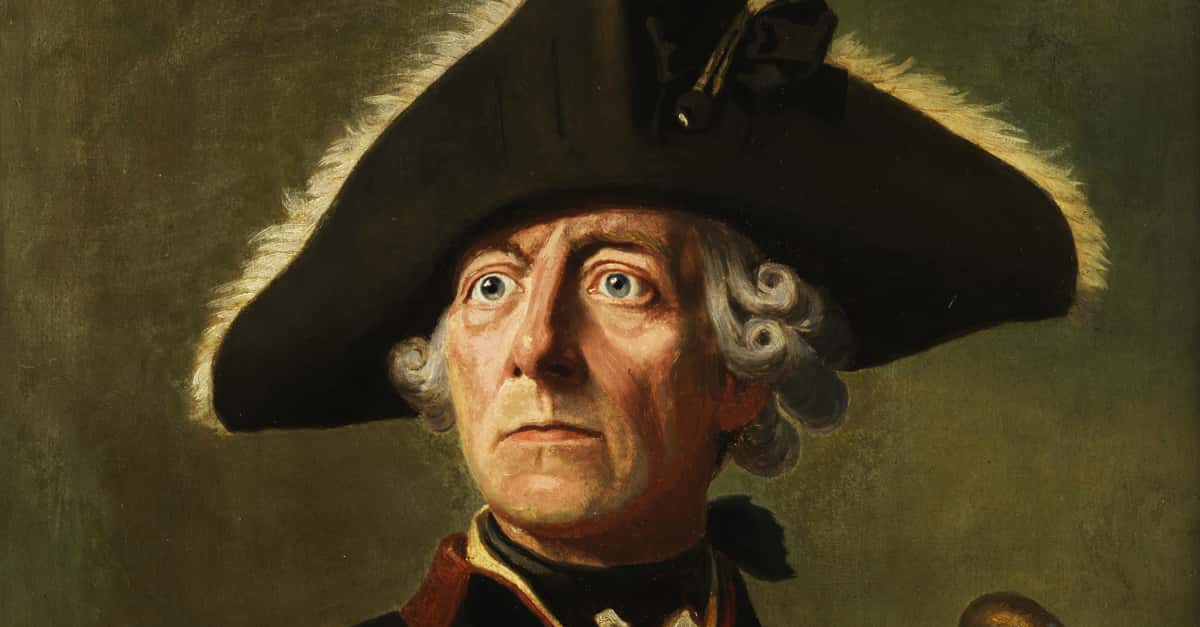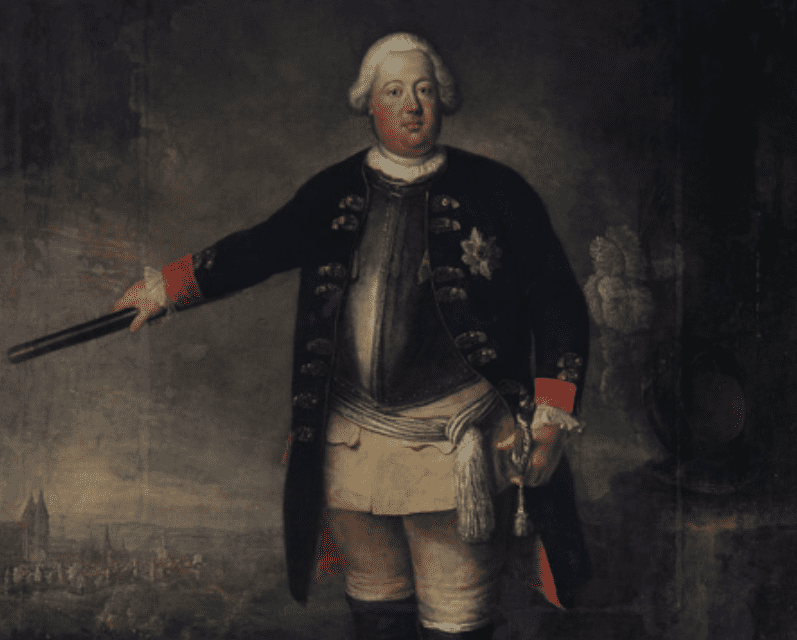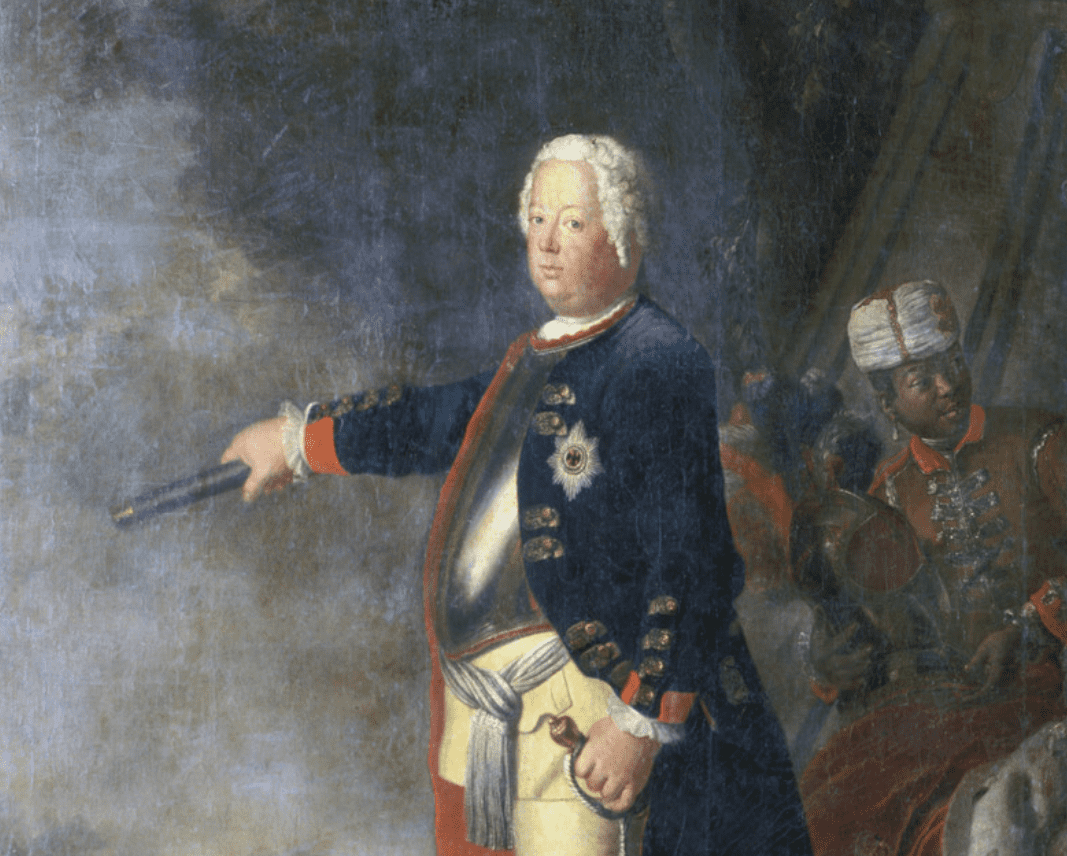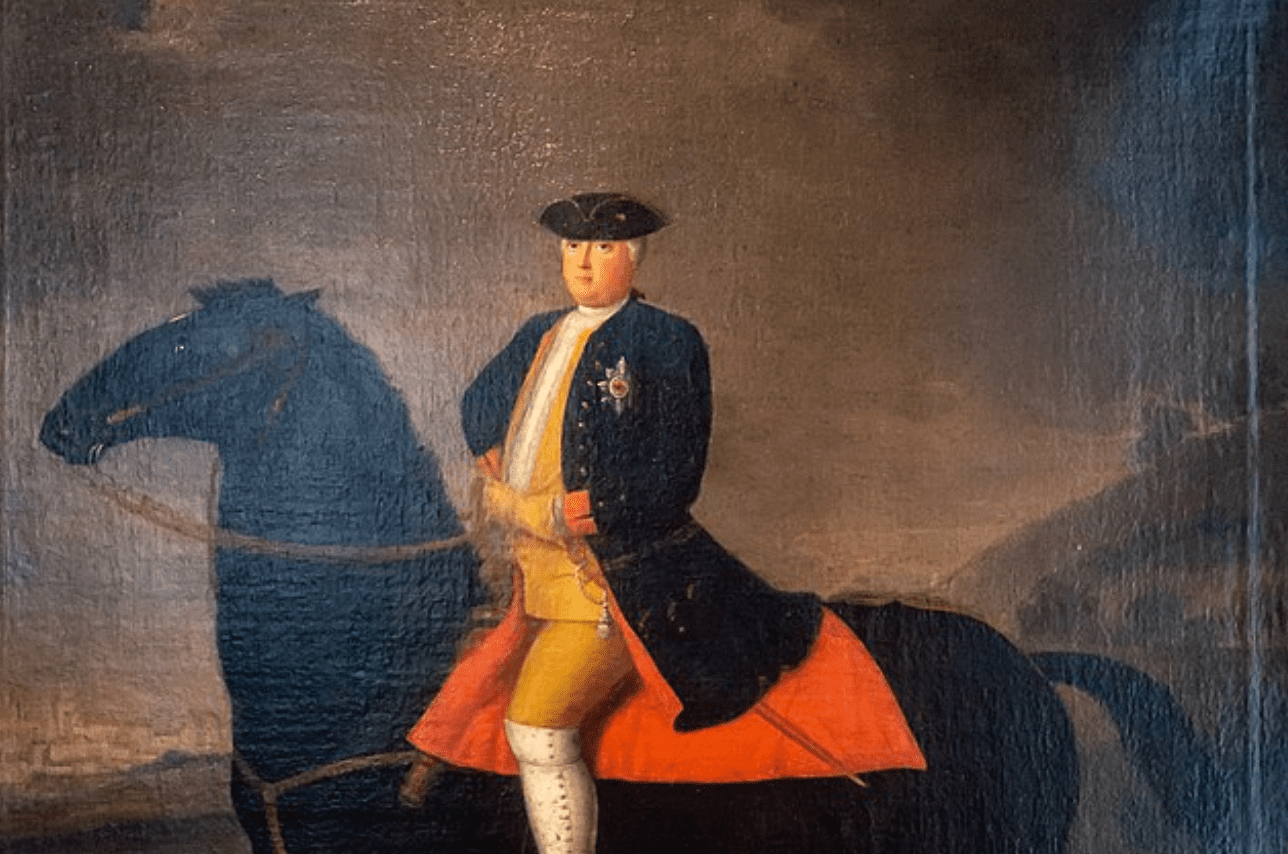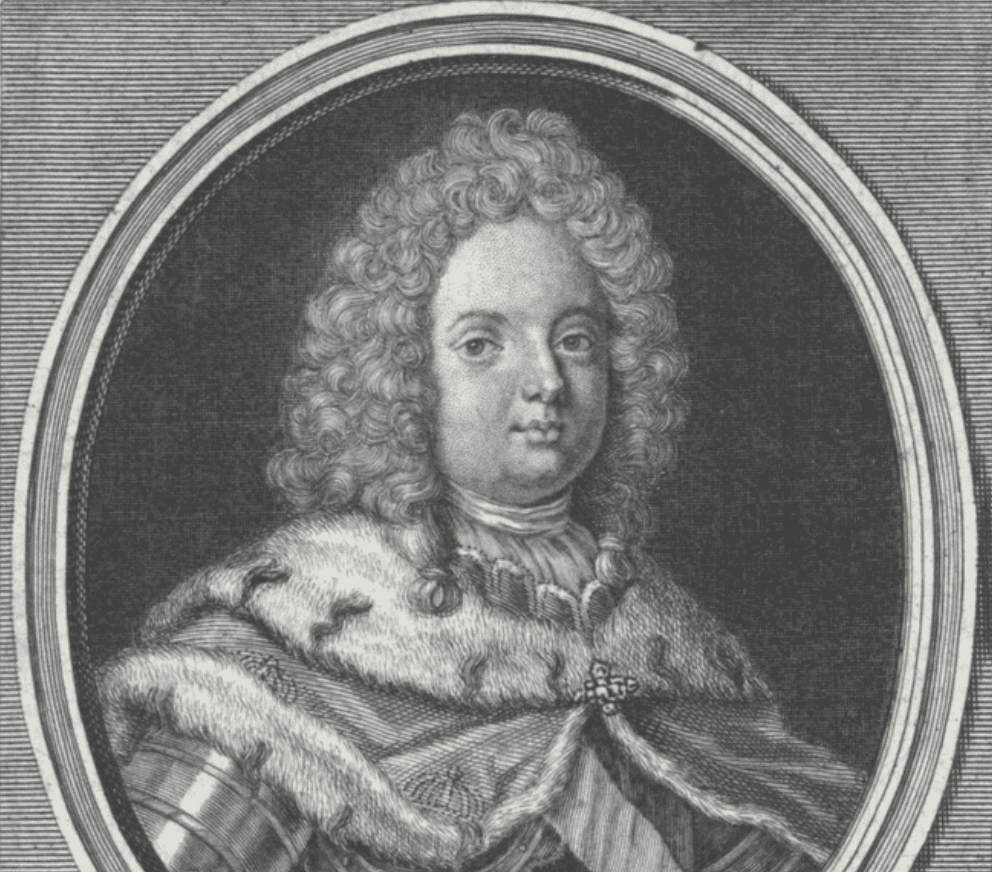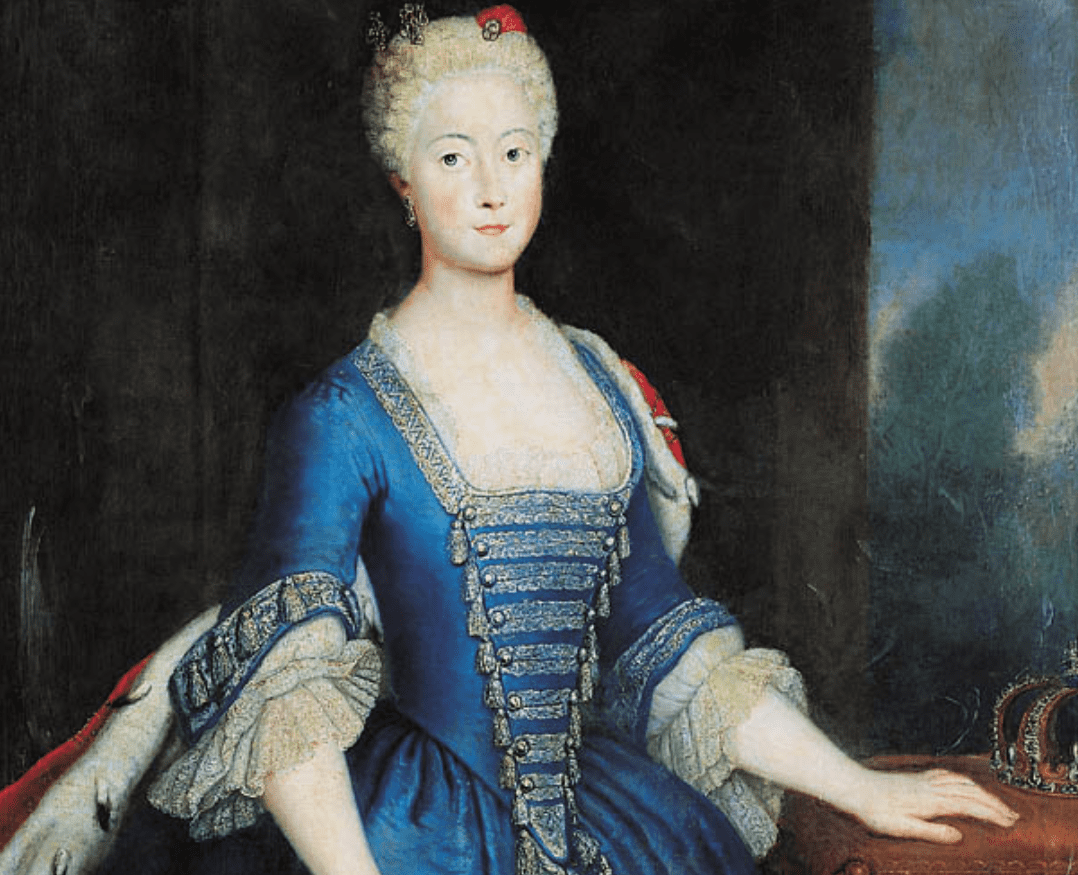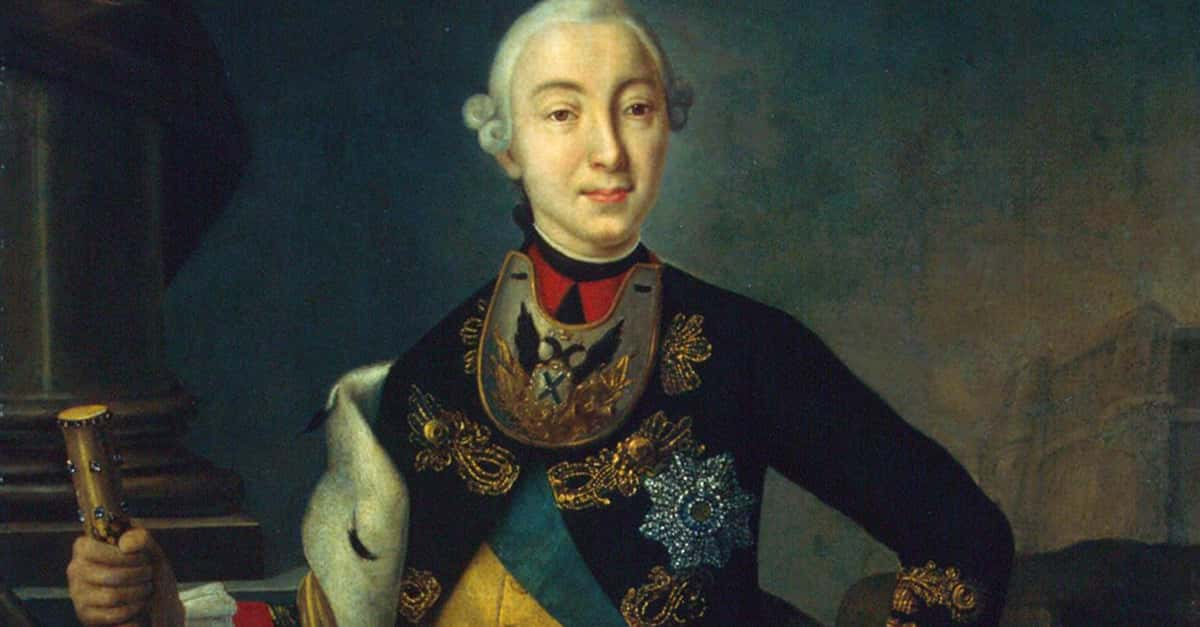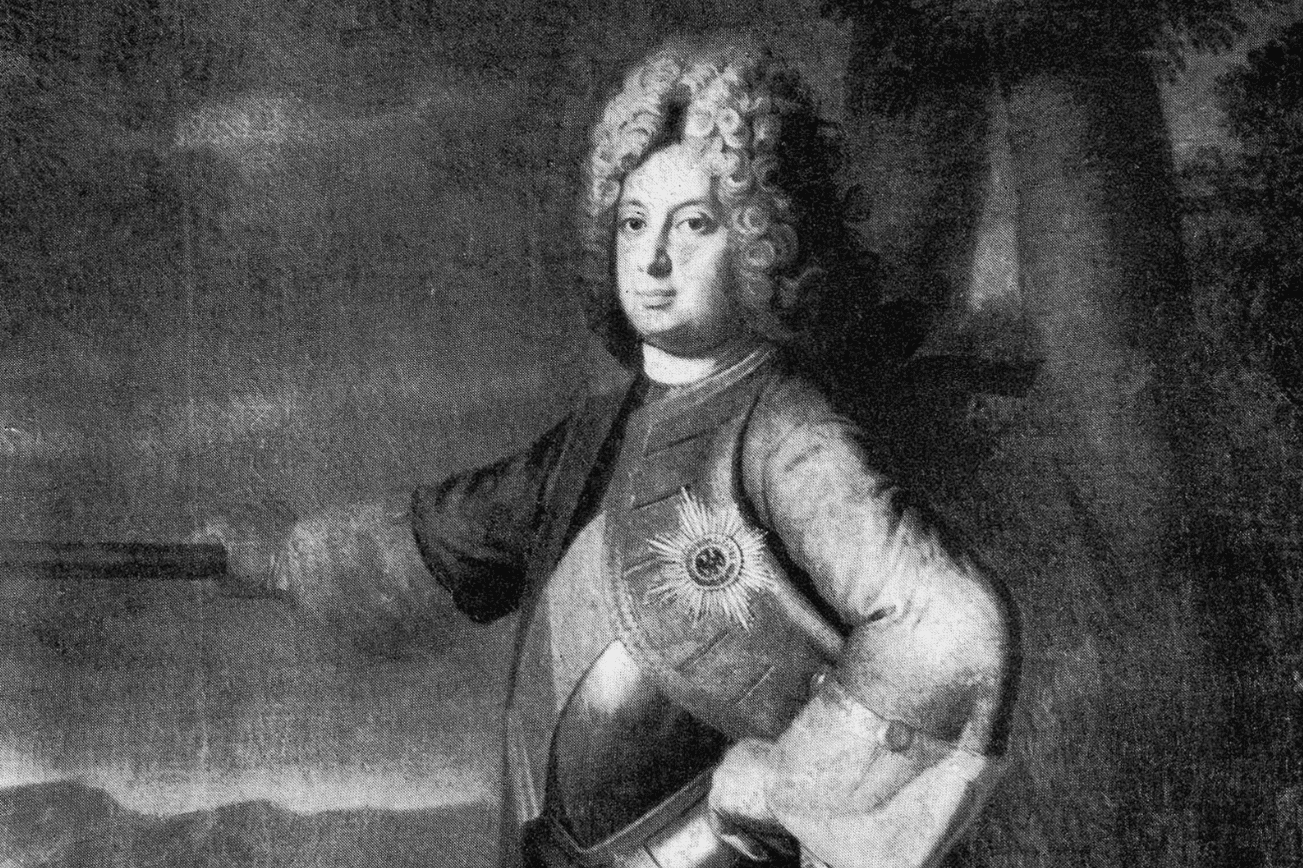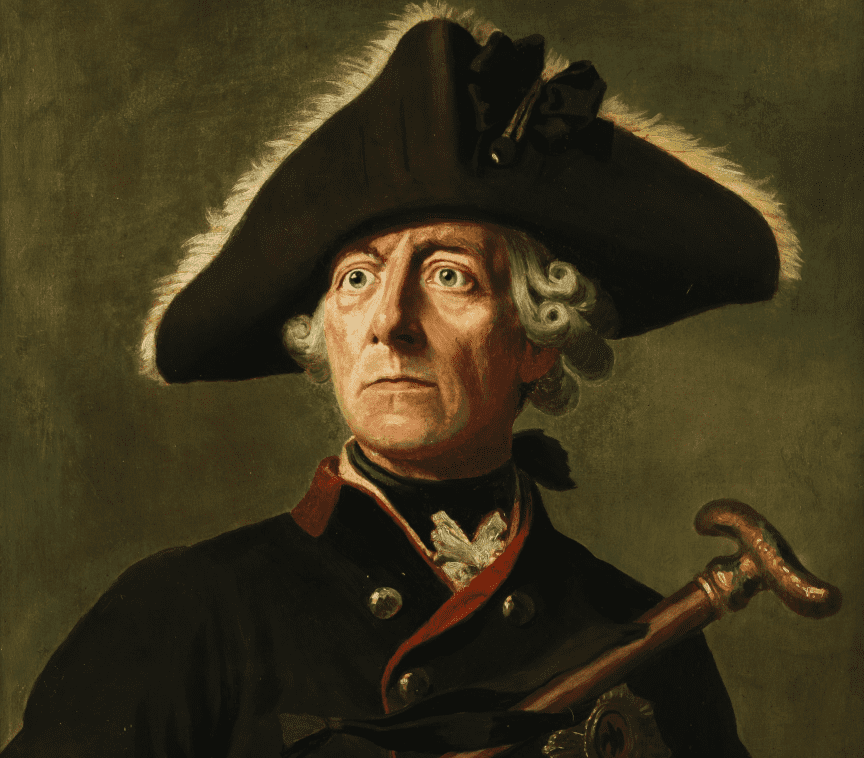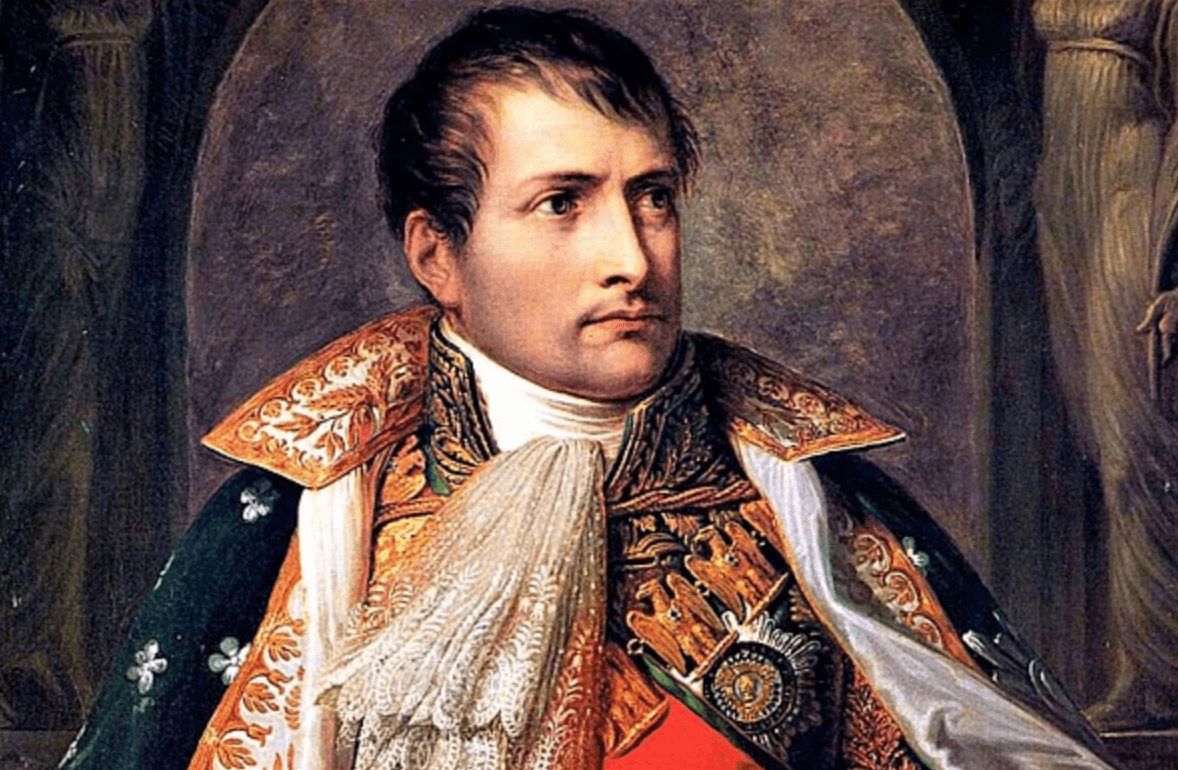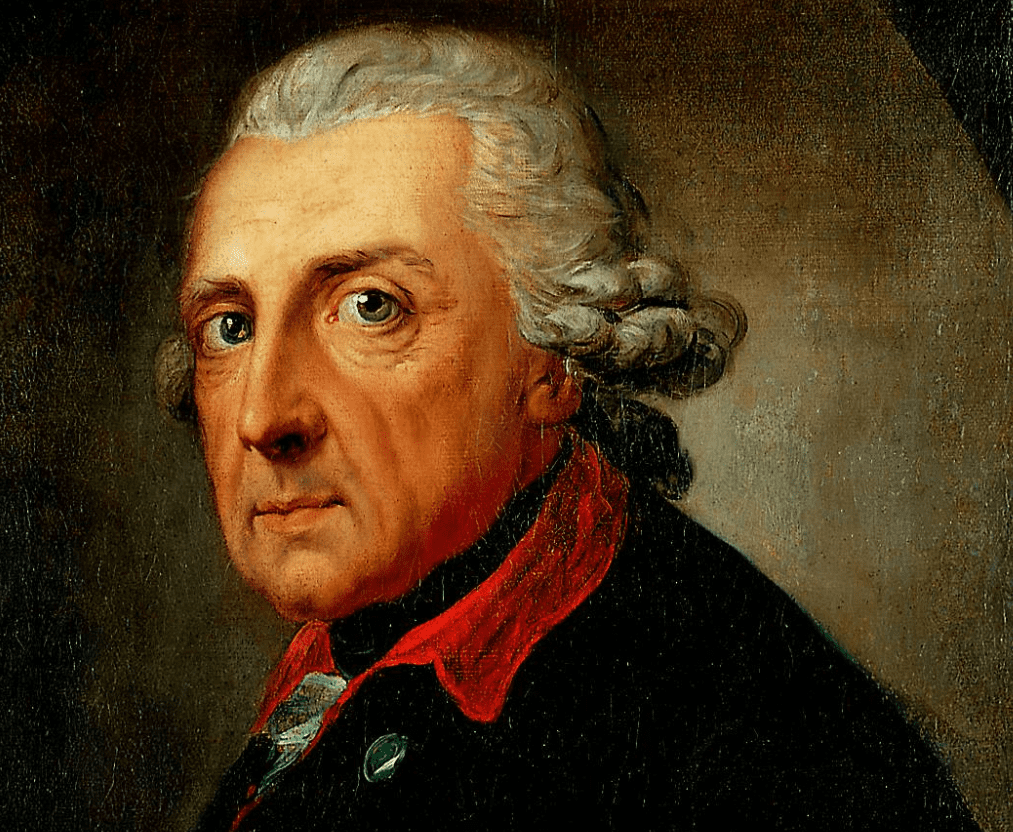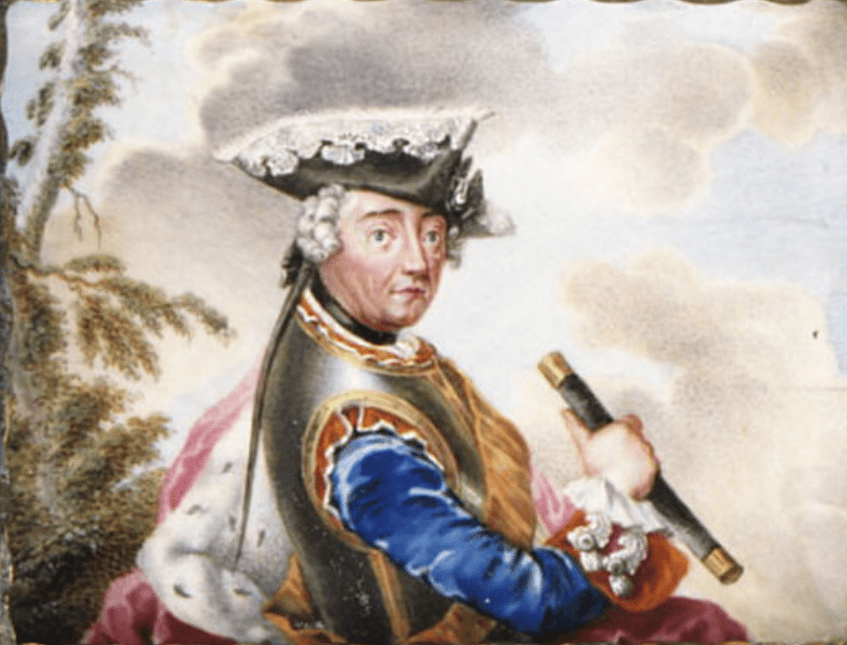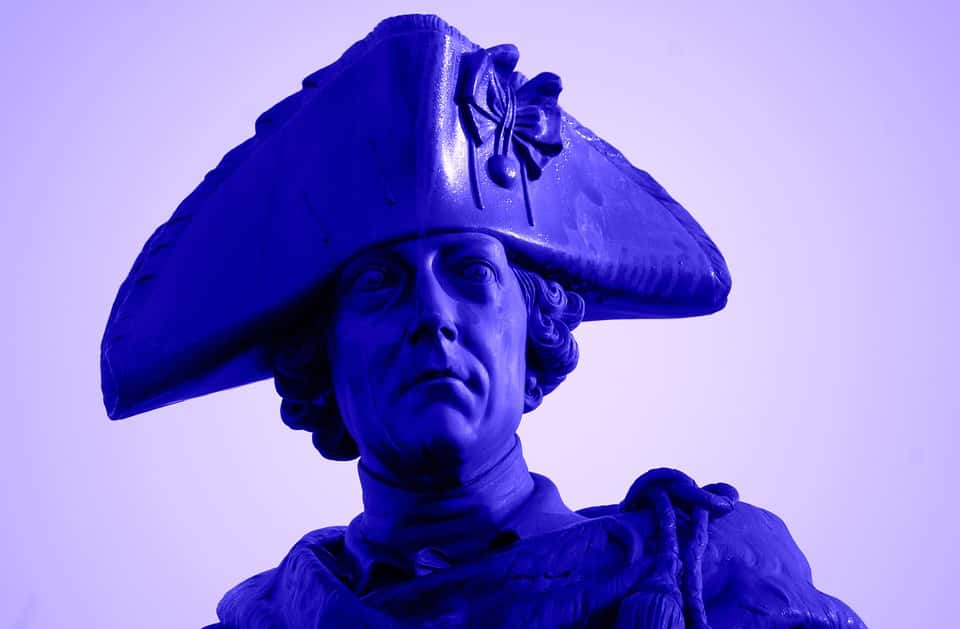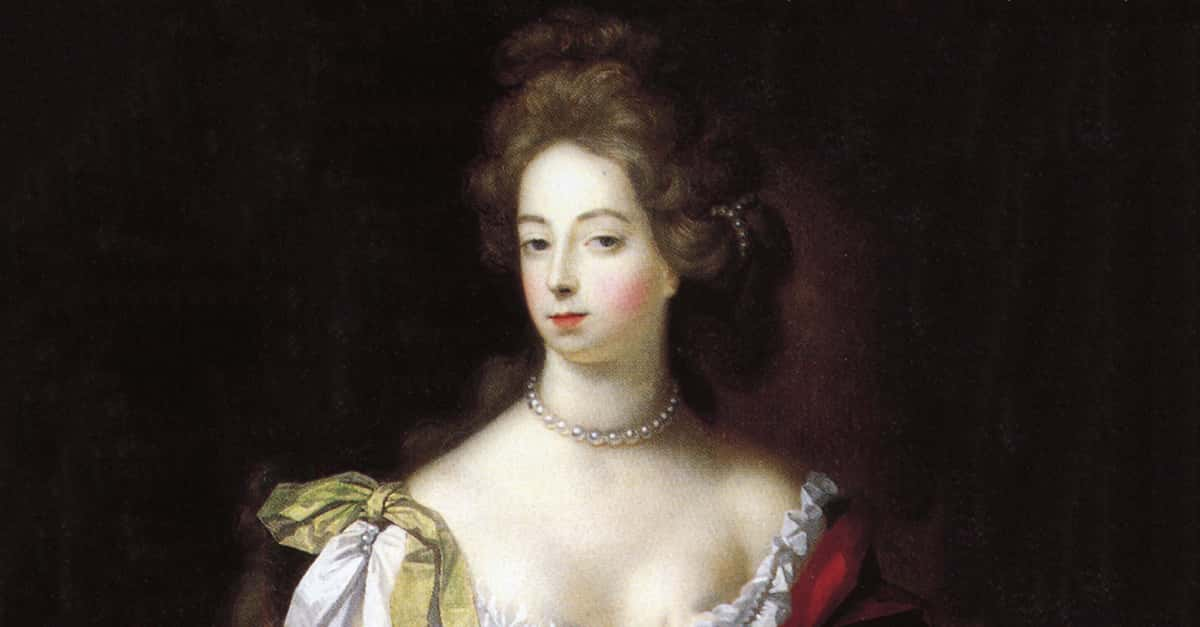Frederick the Great of Prussia was one of the most remarkable rulers Europe has ever seen. After surviving a brutal childhood by the skin of his teeth, he became one of the most brilliant tactical minds of all time. He revolutionized his tiny nation and led them to glory as they had never seen—and he did it all while hiding his true nature from the world. He faced a life of scandal, heartbreak, and betrayal head-on, and made sure that his name ended up stamped on history forever.
1. His Parents Hated Each Other
Frederick the Great was born into a broken home. His parents were Frederick William I, King of Prussia, and Sophia Dorothea of Hanover. Though Frederick William cared for his wife, he believed that a woman should have no influence in court. The fiery-tempered Sophia had other ideas, and she despised her husband for pushing her to the margins. But while she could put up with that, Frederick William's horrific treatment of their children was unforgivable.
2. His Father Was the Worst
Frederick William I was a brutal human being. He was a stark, militaristic man who expected everyone around him to act like they were in the army. No one was safe from his rages—not even everyday Prussian citizens. If he saw someone on the street whom he thought looked lazy, he would strike out and beat them where they stood. But he directed the worst of his rages at his own children—specifically, his eldest son, Frederick.
3. His Parents Suffered Early
Frederick William and Sophia's marriage suffered from great tragedy almost immediately. They welcomed a son soon after their wedding, but he didn't survive infancy. Their son's passing absolutely devastated the couple, and doctors told them that Sophia would never conceive again. It seemed like a miracle then, when she gave birth to many more children, including another son, Frederick, in 1712.
One would have thought that Frederick William would have appreciated his children after what he and his wife had been through—but sadly, that couldn't have been further from the truth.
4. His Childhood Was Miserable
From the moment he was born, Frederick the Great had enormous expectations thrust upon him. His father tried everything in his power to shape the boy into an ideal soldier. Even when young Frederick, or Fritz, as his family called him, was just a toddler, his father had him awoken every morning at the crack of dawn…by cannon fire. Sounds pretty miserable if you ask me—but as Frederick grew older, his father's treatment grew much, much worse.
5. His Dad Treated Him Worst of All
Frederick William I terrorized his children. He would fly into wild rages and lash out at all of his offspring—but his greatest torment was directed at his eldest son. Maybe he just expected too much of young Fritz. Maybe it was because he thought the boy was too much like his mother. Either way, Frederick William made a point of humiliating his heir almost constantly.
He would beat the boy for being thrown off of a horse, or for "showing weakness" by wearing gloves when it was cold. Fritz bore this mistreatment with grim reserve—but eventually, something had to give.
6. His Mother Hated His Father
Frederick sought refuge from his father's abuse in his mother's arms. Sophia Dorothea was everything that Frederick William wasn't. She was worldly and nurturing in contrast to her cold and uneducated husband. She also did her part to widen the rift between father and son. Later in life, Frederick's sister would recall, "Whatever my father ordered my brother to do, my mother commanded him to do the very reverse."
7. His Father Tried to Keep Them Apart
Sophia's attempts to undermine her husband in the eyes of their children did not go unnoticed. The king blamed her for his fraught relationship with his family (not, you know, the beatings) and banned her from seeing them without him present. When it came to Frederick, it went even further, and he didn't even allow the two of them to communicate. Of course, that didn't stop them...
Frederick and his siblings would meet with their mother in secret at night, and they all turned even more against the king. This fractured family was breaking apart at the seams—and it was only a matter of time before it burst.
8. He Tried to Escape His Father’s Clutches
When Frederick was 18, he had finally had enough of his father. Enough of the impossible expectations, the humiliation, and the beatings. With the help of his closest confidant, Hans Hermann von Katte, Frederick fled Prussia in secret, bound for England and a life outside of his father's shadow. However, when Frederick William discovered the plot, his response was utterly brutal.
 The Great King,Tobis Film
The Great King,Tobis Film
9. His Father Caught Him
Frederick's grand escape plan fell apart almost as soon as it started. The king foiled their flight right away and dragged the pair back to Prussia to meet their grim fate. When he walked back into his court, he lied to his wife and told her that her son was dead. When pressed, he continued, "He was not my son, he was only a miserable deserter." Sophia was inconsolable, and she began wailing in grief—which only made her husband even more furious.

History's most fascinating stories and darkest secrets, delivered to your inbox daily.
10. His Dad’s Reaction Was Terrifying
His wife's outburst caused Frederick William to lash out at whoever was closest to him. On that day, it happened to be his daughter Wilhemine. The other children had to drag him off of her, but it was at that moment that his son's partner, Katte, arrived as a prisoner. Still in a rage, Frederick William turned his anger upon Katte and beat his helpless prisoner in front of the entire court.
Still, if Katte had managed to come away from the affair with nothing more than a simple beating, he would have considered himself lucky.
11. He Watched His Friend Lose His Head
The courts sentenced Katte to life in prison for desertion, but that wasn't enough for the bloodthirsty king. He stepped in and laid down a new sentence personally. Not only did he have Katte beheaded, but he also forced his son to watch. Frederick was devastated as he watched Katte's head fall to the ground—but his father was just getting started.
12. His Father Wanted Him Dead
If Frederick William had had his way, his son would have met the same fate as Katte. However, even the King of Prussia can not simply execute his son and heir on a whim. When the Holy Roman Emperor Charles VI heard about Frederick William's plot, he personally intervened and ensured that the courts changed the Prince's sentence to mere imprisonment. Not exactly a glamorous fate for the Prince of Prussia, but better than the headsman.
13. He Learned How to Fight
Frederick only stayed in prison for a few months, but even after he walked free, his father refused to allow him to return to court. He spent the next two years in exile—but he used that time wisely. While he had always preferred philosophy and the arts, Frederick spent his sojourn being schooled in statecraft and the arts of war. And, to the surprise of many, the artistically-inclined prince took to these subjects like a fish to water.
When he was young, Frederick's hawkish father resented that his son was not more warlike. Ironic, then, that Frederick eventually grew into one of the greatest generals of all time.
 The Great King,Tobis Film
The Great King,Tobis Film
14. He Repaired His Relationship With His Father
The Katte affair should have permanently broken Frederick's relationship with his father, but time heals all wounds. The king eventually allowed Frederick a brief return visit to Berlin to attend his sister's wedding, A year after that, he allowed his boy to return permanently. Father and son made amends (though I wouldn't exactly say they were best buds), and next, the king set about finding his son a wife.
15. His Didn’t Want to Marry His Wife
Done with playing games, Frederick William forced his son to marry a German Duchess by the name of Elisabeth Christine. It was not exactly a match made in heaven. Though the two of them remained married for the rest of Frederick's life, theirs was always a loveless union. Frederick despised his wife's company, spent almost his entire life separated from her, and they never had any children. In fact, just the idea of marrying Elisabeth sent Frederick into one of the darkest moments of his entire life.
16. He Nearly Took His Own Life
In letters to his sister, Frederick wrote that he could never love the woman he was to marry—that the two of them could never even be friends. He grew so hopeless that he actually considered taking his own life. However, despite his dread, he ended up going through with the wedding anyway. Yes, their marriage was a sham, but at least it got the king off of Frederick's back for the time being.
 The Great King,Tobis Film
The Great King,Tobis Film
17. He Got a Few Happy Years
Oddly enough, the years that followed Frederick’s unwanted marriage were some of the happiest of his entire life—probably because he spent almost none of them with his wife. He secluded himself in a lavish palace just north of Berlin and formed a haven for the nation’s artists. Surrounding himself with writers, musicians, and actors, Frederick spent these days watching plays, writing music, and generally having the time of his life.
But no good thing lasts forever. Dark days were just around the corner, and Frederick's life was about to change.
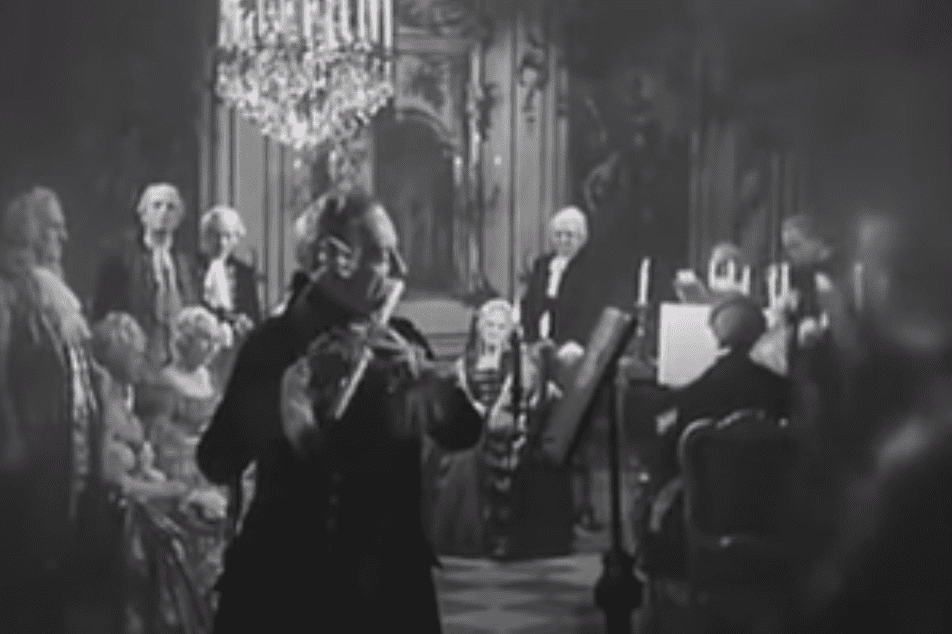 The Great King,Tobis Film
The Great King,Tobis Film
18. His Father Bit the Dust
As King Frederick William grew older, a series of painful illnesses saw him confined to a wheelchair. Still, no infirmity would stop him from flying into his rages. The only difference now was that all he could do was throw whatever was in reach at the objects of his ire. He eventually succumbed to his illness at just 51 years old, leaving his hated son Frederick as king.
Frederick William always believed that his “effeminate” son didn’t have what it took to be a great ruler. Little did he know, his son would turn out to be 100 times the king that he ever was.
19. He Preferred His Mother to His Wife
Once Frederick became king, his mother’s fates changed. She suddenly became the most important and influential woman in court—much to the frustration of his estranged wife, who found herself pushed even further to the sidelines. To put salt in the wound, he would frequently make the journey to visit mommy at her distant residence, while he still almost never visited his queen.
20. He Hated…Yet Respected His Father
If Frederick William I of Prussia had been my father, I would have danced on his grave. Not Frederick the Great. He managed at least some measure of reconciliation with his pops. He wrote, "What a terrible man he was. But he was just, intelligent, and skilled in the management of affairs..." That's about as back-handed of a compliment as there ever was, but hey, it was something.
21. His Nation Was One Big Army
Remember that time Frederick spent studying battle? Well, good thing he did. When he became king, he inherited one of the most militaristic nations in history. One out of every 28 Prussian citizens was in the army—compare that to one out of every 310 in Great Britain. It also didn't hurt that his father had been utterly obsessed with his armies, and had ensured they were some of the most disciplined and well-trained men on earth.
People would later say that Frederick's Prussia wasn't so much a state that possessed an army, but rather an army that possessed a state—and Frederick wasn't about to let this elite force go to waste.
 The Great King,Tobis Film
The Great King,Tobis Film
22. He Went on the Warpath
Frederick put his army to use almost immediately. In the year of his ascension, he set out to claim the land of Silesia under the Prussian flag. His brilliance showed from the get go, and he quickly made major gains against the much larger forces of Austria and Saxony. His campaigns in Silesia also led to some of his most famous victories, but few were more ingenious than his stunning maneuver at the Battle of Hohenfriedberg.
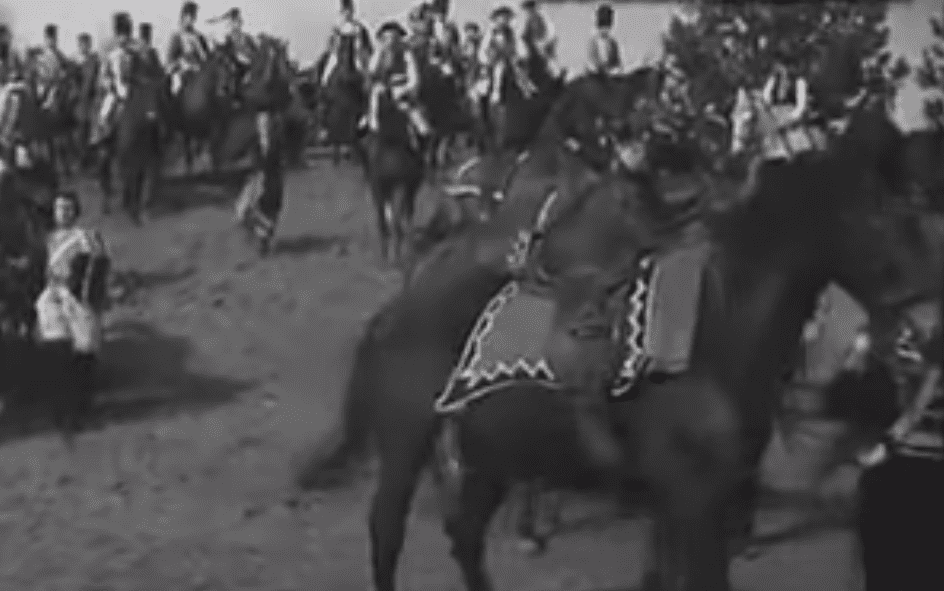 The Great King,Tobis Film
The Great King,Tobis Film
23. He Was a Clever Man
In 1745, Frederick had laid claim to a massive chunk of Silesian land when he heard that the Saxons and Austrians intended to invade and take it from him. Rather than head them off, he allowed them to cross the border mountains and invade—where he promptly pinned them down and demolished them at the Battle of Hohenfriedberg.
When someone asked him why he'd let them invade, his response was legendary: "If you want to catch a mouse, leave the trap open."
 The Great King,Tobis Film
The Great King,Tobis Film
24. Even His Enemies Liked Him
Frederick's prowess on the battlefield even made his greatest enemies admire him. Though Prussia and Russia had been fierce rivals for years, when the feeble Peter III came to the Russian throne, he was utterly obsessed with the ingenious Frederick. One of his first acts as Tsar was to write to Frederick and beg for a Prussian title. He also told Frederick in a letter than he'd rather be a Prussian general than the Tsar of Russia!
Fawning over one of your country's biggest enemies isn't exactly a good look for a leader, but hey, I guess Frederick was just that great.
25. His Father Was Wrong About Him
Frederick's father always assumed that his boy was too soft for the battlefield, but he couldn't have been more wrong. Frederick became famous for leading his men from the front lines. If anything, he was maybe too courageous. Over the course of his career, he had not one, not two, but six different horses shot out from under him.
He personally saw action in sixteen large battles, almost all victories, on top of countless smaller engagements. But Frederick didn't just talk the talk—he walked the walk too.
26. His Back Was Always Against the Wall
Most historians view Frederick as one of the greatest tacticians ever to grace the battlefield. While his army was well-trained and well-equipped, Prussia was still a tiny nation compared to the other European powers at the time. Frederick was almost always outnumbered in battle, no matter who he faced, yet he still managed to come out on top nearly every single time.
Within just a few years of taking the throne, the legend of Frederick the Great had already begun to grow.
27. Napoleon Loved Him
Napoleon Bonaparte himself believed that Frederick the Great was the best general who ever lived. Later, during his own rampage across Europe, Napoleon visited Frederick's tomb in Potsdam. As he looked at his idol's final resting place, he turned to his men and said, "Gentlemen, if this man were still alive, I would not be here."
28. His Victories Were Massive
Frederick's enemies didn't stand a chance. In one battle, the enemy outnumbered his men two to one, yet he still managed to come out on top. His enemies lost 10,000 men on that day—he lost 550. Then, as if that wasn't good enough, he followed up that battle with an even greater victory. This time, he faced down an army of 80,000 with just 36,000 men, and still swept them away like they were nothing. He even took 20,000 enemy men prisoner as a cherry on top.
 The Great King,Tobis Film
The Great King,Tobis Film
29. He Didn’t Fit In
Almost all modern historians agree that Frederick the Great was gay. Notably, for the era in which he lived, he didn't exactly try to hide it either. Once, after one of his few failures on the battlefield, Frederick wrote, "Fortune has it in for me; she is a woman, and I am not that way inclined." Rather, it seems as though Frederick's orientation was quite central to his entire life.
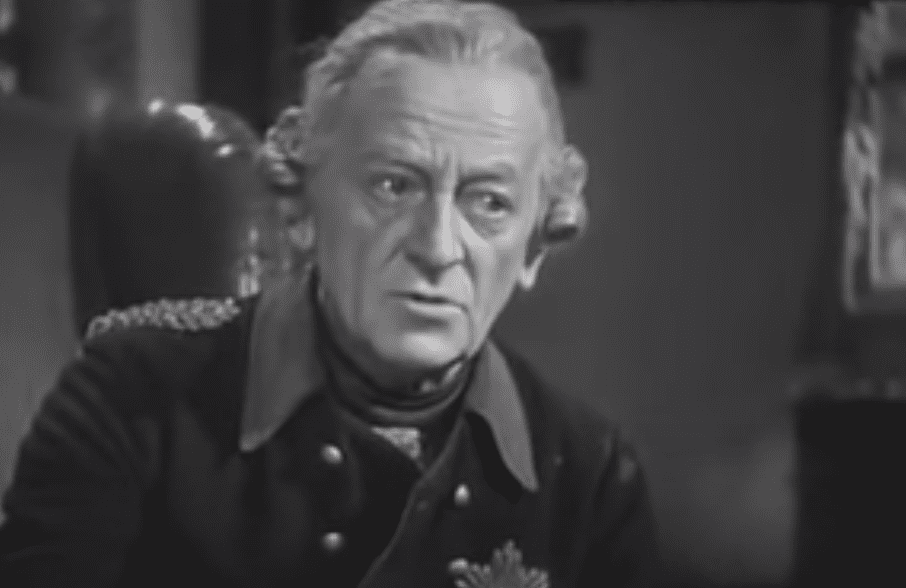 The Great King,Tobis Film
The Great King,Tobis Film
30. He Had an Affair With a Boy at 16
Frederick's homosexuality was likely one source of his conflict with his father. He embarked on an affair with another boy, one of his father's pages, when he was just 16 years old. Rumors about the "intimacy" between the two boys quickly spread across the court. Eventually, they made it back to Frederick's father—who was utterly furious...
31. His Father Didn’t Accept Him
Frederick's father believed in ultra-masculinity and expected it of every man in his court—especially his son. When he found out that Frederick was having an affair with another boy, he lost it. He immediately fired the young page and exiled him to a distant outpost. Meanwhile, he had Frederick sent away to one of his hunting lodges to "repent of his sin."
32. He Put His Money Where His Mouth Was
In 1739, Frederick became infatuated with a dashing Venetian philosopher named Francesco Algarotti. By all accounts, Algarotti shared his affections. So deep was his obsession that Frederick nearly made Algarotti a count—a decision that would have scandalized the Prussian court. In a particularly saucy anecdote, Algarotti once flirtatiously claimed that Northern Europeans lacked passion.
To prove him wrong, Frederick wrote a rather...ahem, explicit poem about Algarotti and sent it to his Venetian boy-toy.
33. He Succeeded in Other Ways Too
Frederick didn't just make his name on the battlefield—he also completely revolutionized Prussian society. His economic policies revitalized the country's financial standing. He enacted judicial reform, ensured freedom of the press, abolished inhumane treatment of prisoners, and limited capital punishment. Was there anything this guy didn't do well?
 The Great King,Tobis Film
The Great King,Tobis Film
34. He Gave Religious Freedom
The king was also remarkably tolerant of different faiths. Though he himself didn't believe in any particular faith, he allowed his citizens to practice whatever faith they wished. Prussia became a haven for Jews and Catholics who saw vicious persecution in other German states. Now, we don't mean to paint Prussia as a utopia, but Frederick was still miles ahead of his time in this regard.
35. His Palace Was Full of Hot Men
When he wasn't out on a campaign, Frederick spent his time at his palace Sanssouci. He surrounded himself exclusively with other men, many of whom were married. His residence contained the extravagant Temple of Friendship, which he filled with the finest homoerotic art that Ancient Greece had to offer.
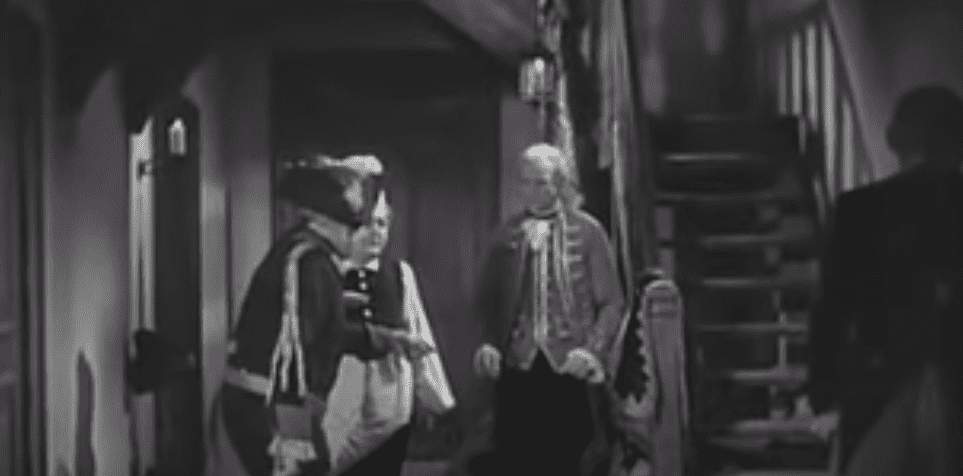 The Great King,Tobis Film
The Great King,Tobis Film
36. He Was the Potato King
Frederick earned his Great nickname, but I prefer his other moniker: The Potato King. With a massive drainage program, he converted vast swaths of marshland into fertile soil, much to the joy of the nation's peasant class. However, there was a dark side to this project. Frederick viewed nature as barbarous and useless, and he dreamed of conquering it for his own use.
The drainage project that created so much new farmland also decimated Prussia's biodiversity and led to the extinction of many local plants and animals.
37. He Destroyed Prussia’s Wildlife
OK, so maybe Frederick devastated his country's wildlife a little bit, but he was still a lover of animals. He founded Germany's first-ever veterinary school and believed hunting was cruel and brutish. He also would famously never wear spurs when riding a horse. Once, someone deigned to comment on the choice, and he replied, "Try sticking a fork into your ... stomach, and you will soon see why." Fair enough Fred, fair enough.
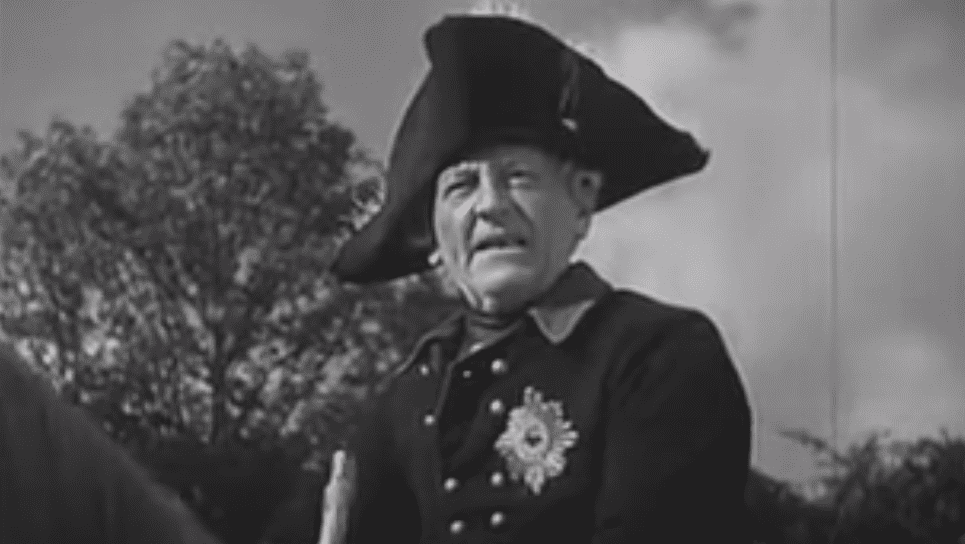 The Great King,Tobis Film
The Great King,Tobis Film
38. He Could Carry a Tune
Somehow, between rampaging across Europe and revolutionizing Prussia, Frederick still found time to...play the flute. The king was a tremendously gifted musician—he wrote over 100 sonatas and four symphonies in his lifetime. Seriously, did this guy ever sleep?
39. Fred and Voltaire
One of Frederick's wildest affairs was with the legendary French writer Voltaire. Frederick was taken with Voltaire upon meeting him, and he soon invited the writer to come to live with him at Sanssouci. The pair were infatuated with one another, and their correspondence would last nearly 50 years—but this fiery relationship led to one of the biggest scandals of Frederick's life.
40. His Affair With Voltaire Was Rocky
Frederick loved Voltaire's writing, but living with the man himself was a different beast entirely. After their initial flirtation started wearing off, Frederick began to find Voltaire's attitude grating. The writer constantly argued with Frederick's other friends and made life around Sanssouci tense for everyone. Voltaire was bound to go too far—and when he finally did, Frederick had to respond.
41. He Finally Got Fed Up
When Voltaire publically humiliated one of Frederick's close confidants, Pierre Louis Maupertuis, the king had finally had enough. He burned Voltaire's writings in public and had his one-time crush placed under house arrest. The was the final straw between the two men, and Voltaire fled Prussia soon after. But their scandalous feud was only beginning.
 The Great King,Tobis Film
The Great King,Tobis Film
42. Voltaire Bared His Secrets
As Voltaire began writing his memoirs, he blatantly outed Frederick's homosexuality and the nature of his court at Sanssouci—sparing no dirty detail. It's impossible to say exactly what Voltaire planned on doing with this information, but in the end, it didn't matter. Before he could publish it, thieves discovered Voltaire's manuscript. When they discovered what lay within, they couldn't believe their eyes.
43. Thieves Revealed His Nature
The thieves who took Voltaire's memoirs took the juiciest bits and published them in the scurrilous pamphlet The Private Life of the King of Prussia. Though it had been an open secret for Frederick's entire life, now his dirty laundry was on display for all of Europe to see. But Frederick himself never seemed to be ashamed of his orientation, nor was he scared of it.
In the end, the publication shocked people but did almost nothing to change Frederick's reputation.
44. He Cast Aside His Wife
Frederick had absolutely no interest in women, and his wife suffered for it. He kept her holed away in her own palace—one that quickly became a lavish prison. She wasted away her years there with nothing to do and no influence in Frederick's exciting court. The king would visit her once a year, on her birthday.
For the rest of the time, he completely ignored her, content to run off with whatever new man caught his eye.
45. His Doctor Tried to Cover Up His Homosexuality
Though Frederick was never ashamed of his homosexuality, that didn't stop people from trying to cover it up. After his passing, his doctor claimed that Frederick suffered from a deformity...down there...after a botched operation. This, so said the doc, left Frederick physically incapable of intimacy. He only pretended to be gay in order to convince people he was virile.
Historians give another reason for his lack of relations with his wife: He had a "physical disgust" of women that left him unable to sleep with them.
46. He Watched the Man He Loved Die
Remember the Katte affair, when Frederick and his close friend attempted to flee Prussia in secret? Though it has never been confirmed, historians widely believe that young Frederick and Katte were lovers. The two men were utterly devoted to each other—and that made Frederick William's chilling response to their desertion all the more heartbreaking.
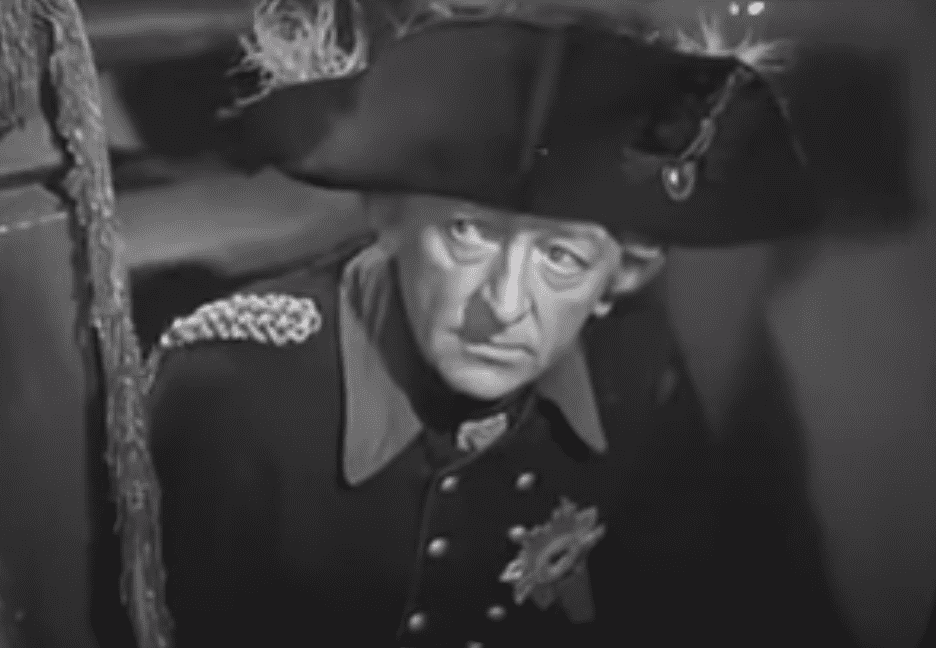 The Great King,Tobis Film
The Great King,Tobis Film
47. Their Final Moments Were Heartbreaking
Frederick was forced to watch his beloved Katte beheaded in front of his eyes. In his lover's final moments, Frederick cried out, "Please forgive me my dead Katte, in God's name, please forgive me!" With his last breath, Katte responded, "There is nothing to forgive, I die for you with joy in my heart!" Upon hearing these heartbreaking words, Frederick collapsed. But his anguish over Katte's end went far deeper than that...
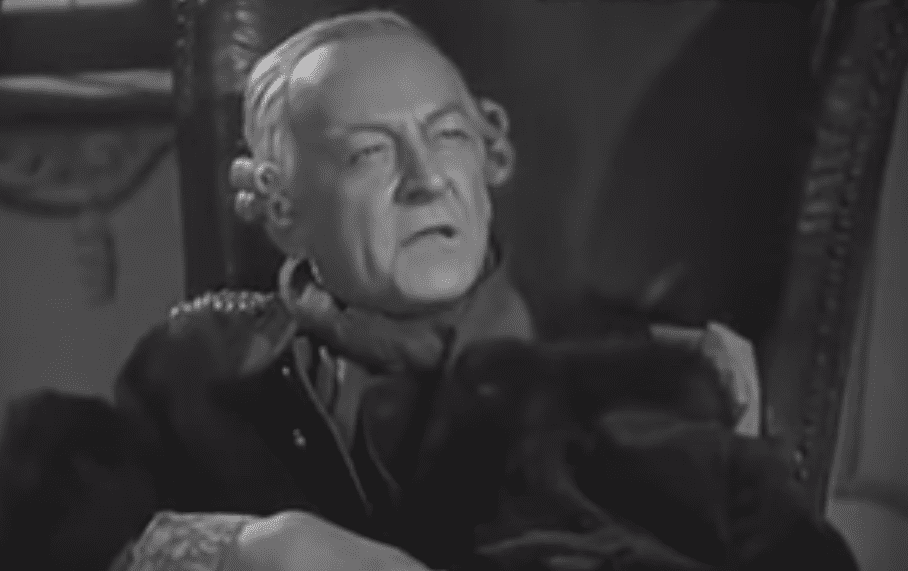 The Great King,Tobis Film
The Great King,Tobis Film
48. His Lover’s Demise Changed Him
Witnessing Katte's execution had a profound effect on Frederick. He was inconsolable for three days afterward, allowing no visitors. When he finally emerged from his chambers, he was a changed man. No one knows what decisions he came to in his despair, but whatever happened, he put the past behind him. He never spoke of his beloved Katte again, and he refused to even visit his grave.
But if his father thought that this nightmare might make Frederick turn his eye to women, he couldn't have been more wrong.
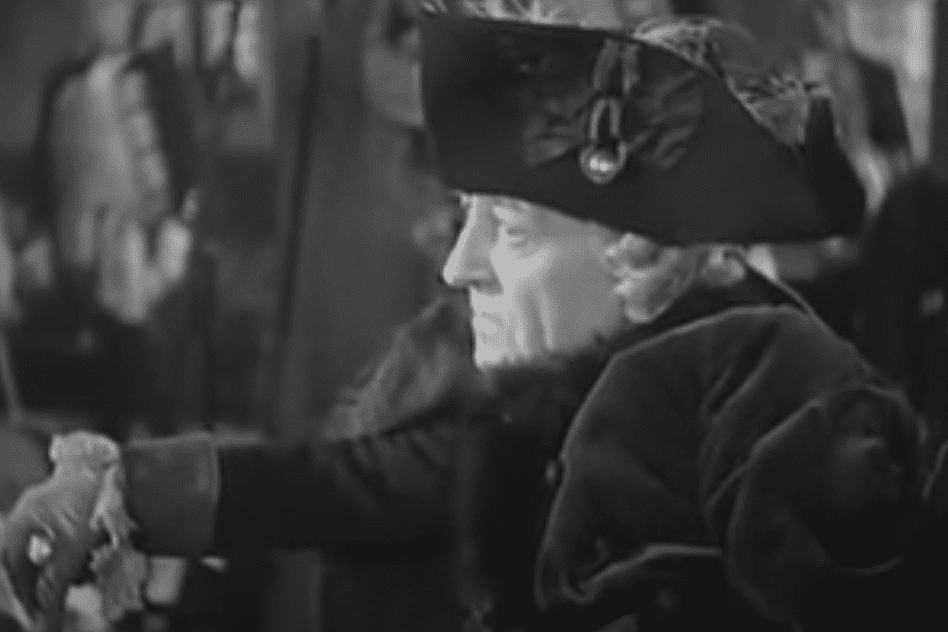 The Great King,Tobis Film
The Great King,Tobis Film
49. He Grew Isolated and Difficult
As Frederick the Great grew older, many of his close circle bit the dust, leaving him to lead a mostly solitary existence at Sanssouci. He became hostile and impossible to please, and he started alienating almost everyone around him. On top of that, he suffered from crippling asthma, gout, and just about every other illness you could dream up.
But did that slow him down? Not even close. Even at the end of his life, Frederick the Great rose at the crack of dawn each morning, fueled by six to eight cups of joe, which he filled with mustard and peppercorns to give it that extra kick.
50. It Took Two Centuries to Grant His Last Request
Frederick the Great finally gave out on August 17, 1786, while sitting in his armchair. He left orders to be buried with his beloved greyhounds in his vineyard, but his nephew and successor, Frederick William II, had other plans. He had Frederick buried in the worst place possible—alongside his hated father in Potsdam. But don't worry, Frederick eventually got to lay where he wished.
In 1991, on the 205th anniversary of his end, Frederick's remains were exhumed and brought to his beloved Sanssouci. There, he was placed in the tomb that he had built for himself all those years earlier.

